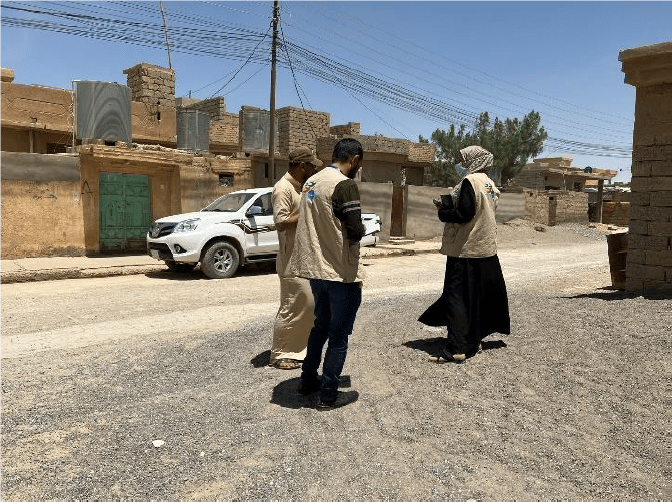Reconciling a Family and Preventing conflict
Shuttle negotiations and violence prevention in Ba’aj District, Iraq
Quarrels among families are common everywhere. However, in certain contexts, family disputes can escalate and involve entire communities. This is why, when one such quarrel turned violent in Ba’aj District, in northern Iraq, NP’s role in deescalating the situation was crucial.
NP’s protection officers were conducting a patrol in Raad Village, near Ba’aj Town, Iraq, when a man named, Bilal, approached them — as often occurs during patrolling activities — and shared an alarming story about a family quarrel among his relatives that had turned violent.
Bilal, a man who works as a shepherd, was away for months at a time. He left his wife, Sada, and children at home. Fearing for her reputation and safety of her family without Bilal, Sada asked her family to take her and their children back to her father’s house in Ba’aj until her husband returned — which, according to her, is not an uncommon practice.
When Sada’s brother came to collect her and the children, her husband’s family, whose house is adjacent to Bilal's and Sada's house, intervened to stop them. They believed it was an offense for the woman not to feel safe with other relatives of her husband living next door. A physical fight followed, leaving Sada’s brother with a broken arm and injuring his 10-year-old nephew he brought with him. Sada's brother was only allowed to take her and her infant child to their parents’ house. Sada’s four other children stayed with their paternal grandparents.
The incident had taken place over six weeks prior to NP’s involvement. Since then, several attempts at tribal mediation had been made without success. Sada’s family was asking for Bilal’s relatives to be banned from Ba’aj as a result of the fight, preventing them from being in public spaces (like the market) for fear of breaking tribal custom. Bilal's family also believed Sada’s family was carrying weapons and would attack them if they went to Ba’aj.
There was a high risk of escalation and both parties were growing impatient with the lack of resolution, but there was a renewed hope of reaching an agreement with NP’s support.
Adopting a balanced approach, NP engaged with all parties involved in the conflict and served as an intermediary between them. These "shuttle negotiations" began to de-escalate the conflict and reduce tensions, avoiding the use of violence.
NP made sure to involve the tribal mediators who had previously attempted to reach a solution for the conflict. This time, after NP’s involvement, the families were more willing to negotiate. NP thereby made sure to involve local leadership, and was able to rely on the influence and respect the mediators hold in the community in order to support the families in reaching a solution.
“You [NP] protected us and helped us feel safer. You prevented a bloodshed between relatives and, most of all, you brought our views closer,” said Bilal’s father.
The families agreed to a reconciliation meeting, during which the parties were able to reach an understanding in accordance with tribal law — without the use of violence — amending the relationship between the two families.
Through shuttle negotiations, NP mitigated the risk of intra-tribal violence, and managed to create understanding and build confidence in local conflict-transformation mechanisms.
Names changed for privacy.

